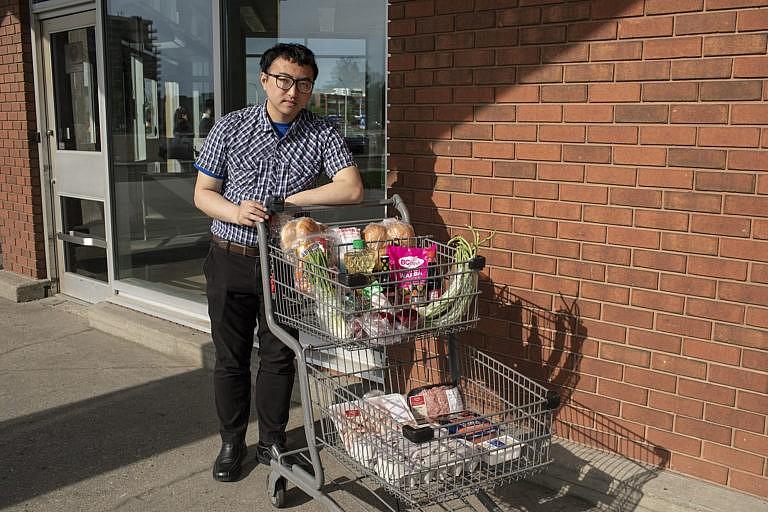The Food Diaries: Groceries on a budget in Edmonton
“I don’t go grocery shopping with a list. I just go in and look for discounted items.”

(Photo by Amber Bracken)
Share
With the rising costs of nearly everything, Canadians are particularly feeling the pinch when it comes to rising food costs across the country, further fuelling a food insecurity crisis being experienced by many throughout the nation. Here, Him Chu, a real estate analyst living in Edmonton, Alberta, shares how he manages to feed his family after moving from Hong Kong to Edmonton earlier this year
Until recently, I lived in Hong Kong with my mom and dad in a two-bedroom apartment. My parents, who are in their 60s, recently retired, so now I’m responsible for supporting them. In April of 2022, we decided to leave Hong Kong because it was getting too expensive. I applied for jobs across Canada and got one working as a real estate analyst for a consulting company. I assess all types of properties, from agricultural to residential, high rises to bungalows.
We live in a two-bedroom apartment in Edmonton. The rent here is much cheaper—we pay $1,300 a month, compared to the equivalent of $2,100 in Hong Kong. And my income is about the same as it was in Hong Kong. But we were really surprised about the cost of groceries. I noticed that the price of beef has gone up by 10 to 15 per cent. Snacks are more expensive too. A bag of Lays used to cost under $3, and now it’s up by a dollar.
I do most of our grocery shopping at Save-On-Foods and T&T. I spend about $100 a week. I don’t go in with a list—I look for yellow stickers on packaged vegetable items because that means they need to be sold within the day. They’re 50 per cent off, so a pack of bok choy that’s usually $1.99 a pound will be $1. We don’t buy meat very often these days; when we do, it’s cheap meat, like sausages. I can’t remember the last time I bought a steak. I’ll pick up the package, check the price and turn away because it’s so expensive: sometimes more than $20 for one steak. I wish I could buy it. Maybe if I can earn some more money and work harder, I can eat better. My mom does most of the cooking, and she’s pretty creative about making meals with whatever I’m able to buy.
I try to buy groceries on monthly customer appreciation days, when I can get a 15 per cent discount, which saves me about $30. I’ll also go to the grocery store one hour before closing in order to get discounted items, like baked goods—for example, a pack of 12 muffins that would normally cost $4 would be marked down to 50 per cent off. I have to use a credit card to buy groceries because I often don’t have enough cash. Some months I ask friends back in Hong Kong to transfer me money to help pay the bills. I’ve borrowed about $500 so far.
I feel lucky that I’m able to maintain my income and my career in Canada, because immigrants often have to accept lower wages or change their line of work. I got a second job doing general labour for a construction company twice a week so I can earn some extra income. But I’m not sure how long we’ll stay in Canada. After a few years, we might move to Thailand or Taiwan, where the cost of living is cheaper.
Hot dogs were on sale last week. They usually cost $11 or $12 but were on sale for $8. I ate them with instant noodles for my lunch. Some days I just eat fruit for lunch so I can keep my budget low. I like chips and chocolate bars, but sometimes I feel guilty about buying that stuff because it doesn’t fill you up like a meal. I should be spending my money on something healthy. — As told to Andrea Yu
This story is part of a series on food insecurity in Canada funded by the Maple Leaf Centre for Food Security, in partnership with Community Food Centres Canada.